The following is a collection of MEMRI TV clips expressing support for the 2020 Middle East peace initiatives. Producing such content is very costly, and your help allows us to continue our vital work of supporting counterterrorism efforts in the U.S. and throughout the West. We are very grateful to those of our valued readers who have already donated this year, and ask those who have not yet done so to please consider making a tax-deductible donation now.
This year MEMRI produced dozens of reports and clips on reactions in the Middle East and South Asia to the historic Abraham Accords Peace Agreement normalizing relations between Israel and the United Arab Emirates (UAE), Bahrain, Sudan, and Morocco. These reactions, from these countries as well as from Iraq, Saudi Arabia, Qatar, Kuwait, Iran, Egypt, Yemen, Pakistan, and Palestine, as well as from ISIS, Al-Qaeda, Hizbullah, Hamas, and Fatah, range from support and praise for the agreements and criticism of those, especially Palestinians, who oppose them to harsh condemnation of the agreements and even predictions that they will set the the Palestinians back on the path of terrorism.
This research is part of the MEMRI Reform Project, which informs our constantly growing audience about promoters of reform in the Arab and Muslim world, while highlighting the obstacles that they face in advancing such reforms.
SUPPORT VOICES OF PEACE BY DONATING TO MEMRI'S REFORM PROJECT
The following are selected MEMRI TV clips in support of peace in the Middle East from the Reform Project in 2020.

Lebanese Singer Elissar Zakaria Khoury, known by her stage name Elissa, said in a November 12, 2020 interview on MTV (Lebanon) that the recent talk about demarcation of Lebanon's borders with Israel is evidence that Israel is not really Lebanon's enemy, and that there has been a conspiracy to spread this lie. She said she supported peace with any country. She also said that Lebanese politicians Dr. Samir Geagea and Saad Hariri should be held accountable for bringing Lebanese President Michel Aoun to power. In addition, Elissa said that Lebanon's leaders would all quit if they had any self-respect or if they contemplated what the people think of them.
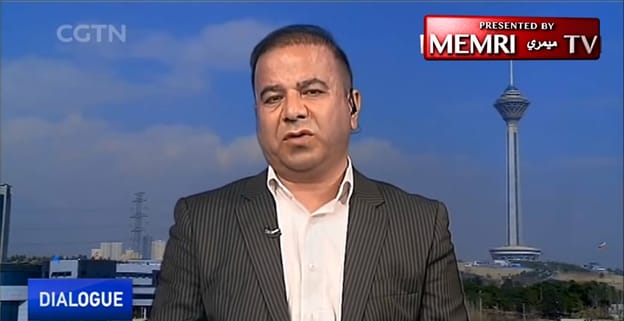
Iranian journalist Ghanbar Naderi, a columnist for Kayhan International, said in an October 20, 2020 interview on CGTN Network (China) that Iran should change its policy towards Israel and its neighbors, that it should stop threatening to destroy Israel, and that it should recognize the sovereignty of Israel, Saudi Arabia, and other countries in the region. Naderi, who was speaking from Tehran, added that the COVID-19 pandemic, which he described as a missed opportunity for cooperation between the United States and Iran, has changed the stance of even hardliners in Iran, to the point that Iran will engage with the United States if it rejoins the JCPOA, if it lifts the economic sanctions against Iran, and if it stops threatening Iran militarily.

Abdel Fattah al-Burhan, chairman of Sudan's Sovereignty Council, said in an interview with Sudan TV on October 26, 2020 that "reconciliation is legitimate even with enemies." He explained that you can sign a reconciliation agreement with any country if it serves the interests of both parties, and he said that lifting sanctions on Sudan is part and parcel of this agreement. Al-Burhan added that a lot has changed since the "Three No's" resolution at the Khartoum Summit in 1967. He explained that the PLO and several Arab countries have signed agreements with Israel since then, and asked: "Why should we stay in 1967?" Al-Burhan stated that Sudan still believes that a Palestinian state must be established within the 1967 borders, but the Sudanese people cannot be left to carry the brunt of this responsibility alone.

Saudi politician Yousef Al-Othaimeen, the Secretary-General of the Organization of Islamic Cooperation, said in an October 18, 2020 interview on Sky News Arabia (UAE) that in order to achieve a resolution to the Palestinian issue, people need to "think outside the box." He said that war has not resolved the issue, so maybe the Palestinians should try different ways to reach a two-state solution. He asked what the point is of insisting that boycotting Israel is the only viable course of action.

Egyptian Journalist Abdel Moneim Saeed said in a September 15, 2020 interview on Ten TV (Egypt) that "the time has come for our Palestinian brothers and their political elite to rethink things." He said there is no reason that the Palestinian cause must oblige all other Arab countries to remain in conflict with Israel, the Palestinians must resolve their cause on their own. Saeed added that a future independent Palestinian state will have to maintain a monopoly over the use of weapons, and no other military wings of Palestinian factions will be able to keep their weapons. He added that Hamas had jeopardized attempts at regional reconciliation in the 1990s and he then compared the movement to Al-Qaeda, Jabhat Al-Nusra, and Hizbullah.
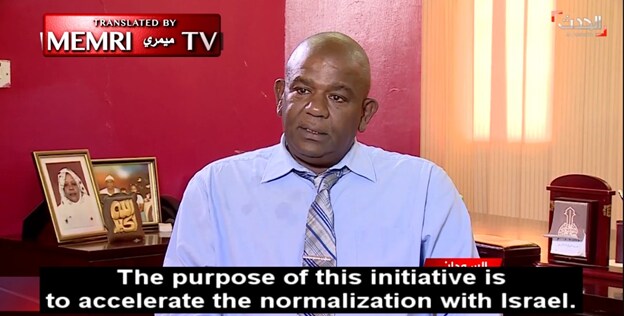
Former Sudanese MP Abu Al-Qasim Bortom, the organizer of an expected delegation of over 1,000 Sudanese citizens to Israel, said in an October 12, 2020 interview on Al-Arabiya Network (Saudi Arabia) that the purpose of the delegation is to accelerate normalization with Israel. He argued that Sudan's issue with Israel is political rather than religious, and he said that the delegation will be welcomed by various Israeli NGOs. Adding that the visit would be a humanistic and cultural visit rather than a political or economic one, Bortom said that the Sudanese people have no enmity towards Israel.

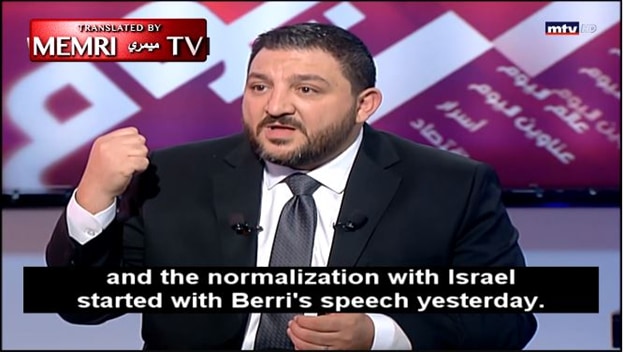
Lebanese journalist Rami Naim, the publisher and general manager of Lebanese news site elsiyasa.com, said in an October 2, 2020 interview on MTV (Lebanon) that Lebanon's recent agreement to border negotiations with Israel, mediated by the U.S., is a sign that Lebanon will eventually normalize relations with Israel. He said that the fact the Parliament Speaker Berri, who represents the Shiites in government, is a party to these negotiations means that Lebanon has recognized the existence of the State of Israel and that Lebanon is no longer conducting an "existential struggle" against Israel, the struggle has now become limited to border demarcations. Naim said that these negotiations spell the end of the resistance against Israel and that peace is coming even if Lebanon is the last country to sign a peace agreement with Israel.

Former Saudi Ambassador to the U.S. Prince Bandar Bin Sultan Al-Saud chastised the Palestinian leadership for its conduct following Israel's peace and normalization agreements with the UAE and Bahrain. His comments were made in an interview with Al-Arabiya Network (Dubai/Saudi Arabia) on October 5, 2020. Prince Bandar said that the Palestinian leaders had "the audacity to say despicable things" about the Gulf countries and their leaders. He added that while the Palestinian cause is just, the Palestinian leaders have failed at garnering support for this cause.

Saudi researcher Abdullah Bin Bijad Al-Otaibi said in an October 2, 2020 interview on Al-Arabiya Network (Dubai/Saudi Arabia) that the best way to establish peace is by looking to the future, and that he believes Saudi Arabia should sign a peace treaty with Israel. He said that unlike previous peace deals between Arab countries and Israel, Israel's peace deals with the UAE and Bahrain is a genuine peace between the people and the governments. In addition, Al-Otaibi said that the Arabs have had enough of the Palestinian leadership's inability to create real solutions, so they have found the "magic formula" of making peace with Israel while defending the Palestinians' rights to their land, to Jerusalem, and to a state.

Syrian writer Dr. Kamal Al-Labwani said on a September 22, 2020 program on the Al-Jazeera Network (Qatar) that the Arab League and the Arab regimes are in their current state because they have been adhering to an ideology of resistance since 1948. He said that this false ideology has been used to oppress people, that it is self-destructive, that it has led to war crimes in the name of liberation, and that it has led to the deaths of Palestinians, Lebanese people, Iraqis, and Syrians. Dr. Al-Labwani also said that the disagreement amongst Arabs is good because it will lead to the reconstruction of the Arab mind. He added: "It is time to do away with this lie."

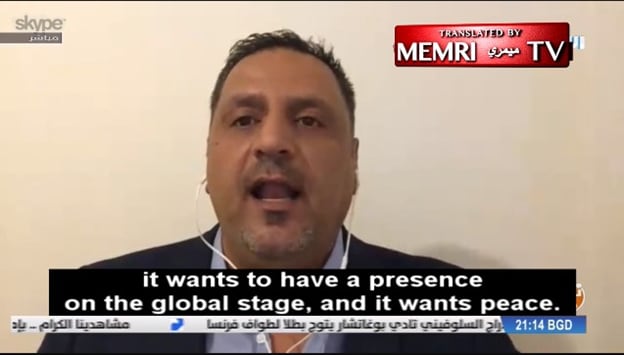
London-Based Iraqi journalist Safaa Subhi said in a September 20, 2020 interview on Etejah TV (Iraq) that he supports Arab normalization with Israel. He said that even the Iranians and the Palestinians have had diplomatic relations with Israel in the past 100 years, and he pointed out that pan-Arabism is gone, saying that there is a new generation of Arabs that is open to the world and that wants peace. He praised the UAE and Bahrain for exercising their sovereignty by signing peace deals with Israel, and he criticized Iran for saying that Israel is its enemy despite not having fired a single bullet at Israel. Subhi added that the people of the Middle East have had enough of Iran's regional intervention.

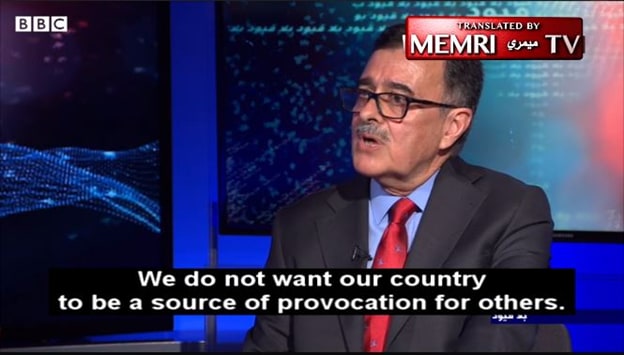
Abdullah Mohtadi, the Secretary-General of the Komala Party of Iranian Kurdistan, said in a September 20, 2020 interview on BBC Arabic (U.K.) that his party wants Iran to have peace with its people and with Israel, the Arab countries, the United States, and Russia. He said that he does not want to destroy Israel or to chant anti-Israel slogans, and that he wants Iran to be a responsible member of the international community.

Iraqi political thinker Hassan Al-'Alawi said in a September 23, 2020 interview on Zagros TV (Iraqi Kurdistan) that Arab politicians can no longer say that they will destroy Israel and throw it into the sea, because Israel has become so powerful. He also said that he thinks most Iraqis would support peace with Israel because they do not want to fight another war after the Iran-Iraq War. Al-'Alawi added that Iraq is leaning towards peace – and even normalization - with Israel, Turkey, and Iran. In a September 26, 2020 interview on Asia TV (Iraq), Al-'Alawi also said that he is certain that Iraqi PM Mustafa Al-Kadhimi would like to establish relations with Israel, especially since the Palestinians themselves recognized Israel decades ago.

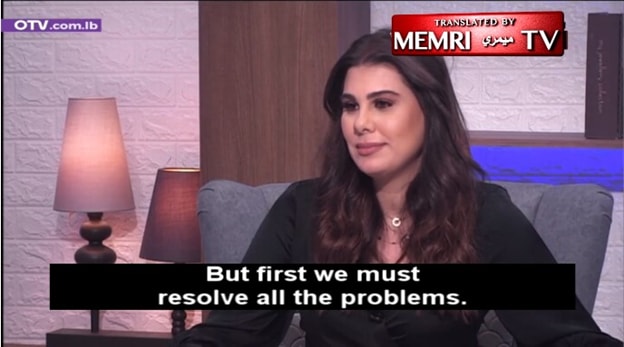
Claudine Aoun-Roukoz, Lebanese President Michel Aoun's daughter and special advisor, said in a September 23, 2020 interview on OTV (Lebanon) that before Lebanon can have peace with Israel like the UAE and Bahrain, its border disputes with Israel must be resolved. She said that everybody wants peace and argued that the weapons of "the resistance" are legitimate according to the Lebanese constitution and international law. In addition, she said that once Lebanon's border disputes with Israel are resolved, she would support a defensive strategy in which all Lebanese people would be part of "the resistance" and would be able to defend Lebanon if it is attacked. She added that she supports the "principle of peace" and that she would like to go to Jerusalem someday. Aoun-Roukoz serves as the President of the National Commission for Lebanese Women, and she is the wife of Lebanese MP Chamel Roukoz, a former Brigadier-General in the Lebanese military.

Syrian political analyst Mazen Al-Olaiwy said in a September 16, 2020 interview on Alghad TV (UAE/Egypt) that the Arab countries did not achieve any substantial gains by waging war against Israel, and he suggested that a peaceful solution has become the best way to restore the rights of the Palestinians.

On September 16, 2020, Emirati Islamic scholar Waseem Yousef posted a video to his YouTube channel in which he criticized Arabs who are speaking out against normalization with Israel. He said that Arabs, and not Israel, are responsible for sectarian strife, wars, bombings of mosques and churches, harboring of terrorists, and the spread of ISIS throughout the Arab world. Addressing Arabs, Yousef said: "Take a look at yourselves while you point weapons at each other… You had better just shut up."
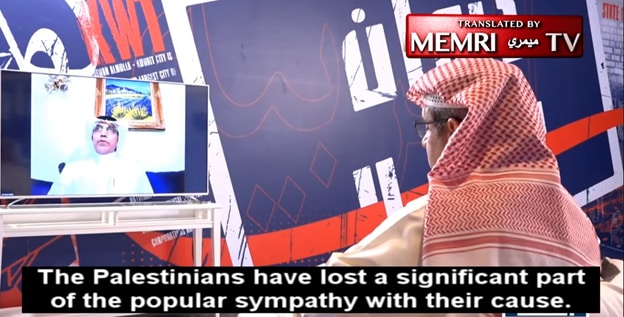
Dr. Saud Al-Kateb, former deputy minister for Public Diplomacy in the Saudi Ministry for Foreign Affairs, said in an interview with Diwan Al-Mullah Online TV (Kuwait) on September 17, 2020 that Saudi Arabia must first look out for its own interests and only then consider the Palestinians cause. He recounted how he would donate his pocket money to the Palestinian cause as a child. Dr. Al-Kateb said that he does not expect the Palestinians to be grateful for all the Saudis have done for them, but he does expect them not to curse them. He said that the Palestinians have made "catastrophic mistakes" in the past towards countries such as Egypt, Jordan, Lebanon, and Saudi Arabia. He added that the Palestinians must stop treating Saudi Arabia as nothing more than a faucet streaming support to them.

Ahmed Al-Saati, Bahrain's Ambassador to Russia, said in a September 15, 2020 interview on Russia Today TV that Bahrain and the Arab states will reap the fruits of peace from the upcoming peace agreement with Israel. He said that the Arabs have only lost martyrs in their wars with Israel, that peace may provide new opportunities, and that he expects that the Palestinians will "calm down" with time and reconsider their negative reaction to the Arab-Israeli peace initiatives. He said that PA President Mahmoud Abbas should "calm down a bit" and turn back towards Egypt, Saudi Arabia, Bahrain, and the UAE because they have supported the Palestinian cause for 70 years and can together find new ways to serve the cause. In addition, Ambassador Al-Saati said that Iran will pay a heavy price if it doesn't lean towards peace in the coming future.

Former Iraqi MP Mithal Al-Alusi said in a September 13, 2020 interview on UTV (Iraq) that while Israel has won wars and expanded, the Iraqis have failed to build a successful state and economy. He said that Iraq should be able to defend itself before defending the Palestinians, that Gaza and the PA are Israel's number one partners since Israel gives them money and electricity, and that the UAE and Bahrain have exercised their sovereignty by signing peace deals with Israel. He also said that if anybody wants to go fight Israel, he would "donate a few pennies" to help them leave Iraq and enter the Golan Heights or Lebanon. In a September 14, 2020 interview on Salahaddin TV (Iraq), Al-Alusi also said that in his view, the almost one million Iraqi Jews in Israel are Iraqi citizens. He also said that peace is the language of the future and that anybody who wants to fight Israel should not do so at Iraq's expense. He added: "If you want Iran, go to Iran. If you want Hizbullah, go to Hizbullah."

Former Lebanese minister Sejaan Azzi said in a September 3, 2020 interview on NBN TV (Lebanon) that Israel no longer presents an imminent threat to Lebanon, that Israel has never had any intention of occupying or annexing Lebanese land, and that Israel only invaded Lebanon because of the Palestinians. He said that if the Lebanese military had taken control of Lebanon's southern border and the Palestinian refugee camps, and had it prevented PLO leader Yasser Arafat from creating a state within a state in Lebanon, Israel would never have invaded Lebanon and reached Beirut. Azzi continued, saying that the fact that Israel wants to make peace with the UAE is an indication that it must also want to make peace with Lebanon and Syria, which he pointed out are closer to Israel than the UAE is. He added that even if Hizbullah and other organizations were to continue holding on to their weapons, Lebanon could not live in a state of constant war.
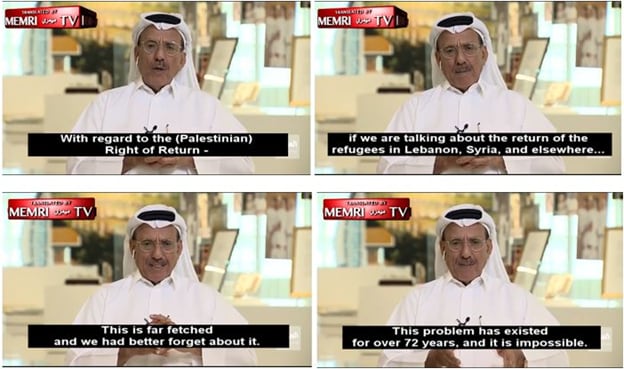
Emirati business magnate Khalaf Ahmad Al-Habtoor said in a September 4, 2020 interview on Al-Arabiya TV (Dubai/Saudi Arabia) that the recent peace deal between the UAE and Israel will be more productive than remote negotiations and nationalist slogans. He said that he supports peace and coexistence and that Israel has not harmed the UAE. Al-Habtoor added that boycotting Israel is impractical because it would mean boycotting all the banks in the world, since Jews and Israelis are invested in every bank in the world. Al-Habtoor also said that the return of the Palestinian refugees from Lebanon, Syria, and elsewhere is impossible and that the Palestinians are responsible for their own tragic situation. He explained that the Arab world supported the Palestinians with billions of dollars in vain, and he gave the example of Hamas, which he said is supporting Iran against the Arab world.
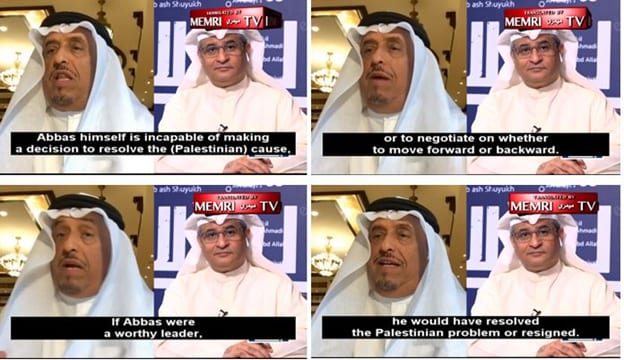
Lieutenant-General Dhahi Khalfan Tamim, Dubai's deputy chief of police and general security, was interviewed on Diwan Al-Mullah Online TV (Kuwait) on September 1, 2020. In the interview Tamim said that unlike Turkey and Iran, Israel has never threatened the Gulf states. He added that the agreement between the UAE and Israel serves the security and stability of the Gulf region in particular. Tamim asked why any ruler should pin their decision-making on PA President Mahmoud Abbas's approval. He elaborated that Abbas is incapable of making a decision to resolve the Palestinian cause and said that if he were a "worthy leader" he would have resolved the Palestinian problem or resigned if unsuccessful. Tamim asked how the public opinion in the Gulf states can be expected to favor Palestinians if they pray for the destruction of these countries in their mosques. He then then referred to Iran, saying it has three choices, either it can die an economic death, sign a peace agreement with Israel and "coexist with the region," or allow the Mullah regime to collapse.
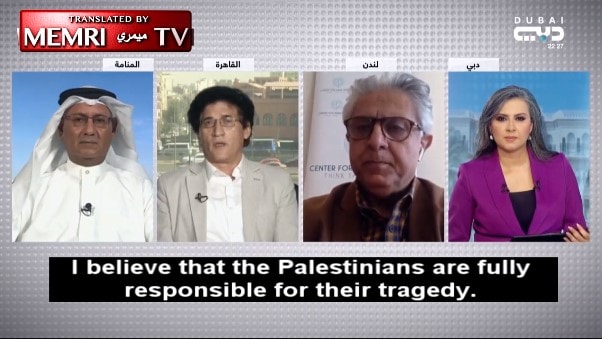
Egyptian researcher Dr. Said Okasha, an expert in Israel studies at the Al-Ahram Research Center, said in an August 24, 2020 interview on Dubai TV (UAE) that the Palestinians are fully responsible for their current "tragedy" because they have chosen align themselves with Islamist and pan-Arab movements. He said that neither of these movements actually believes in the concept of a Palestinian state. Dr. Okasha added that the Palestinians should instead act pragmatically and take advantage of U.S. President Trump's Deal of the Century and of the opportunity for peace that was created by the recent agreement between Israel and the UAE.

Former Iranian national soccer team manager and player Mohammad Mayeli-Kohan was interviewed on the Big Campaign, an Iranian online TV show hosted by Karim Bagheri, who also used to be a member of the Iranian national soccer team. Mayeli-Kohan said that Iran cannot live by itself and that as a member of the United Nations, it must respect the other members states and cannot call for the destruction of a "certain country." The Iranian Athletes' Basij issued a condemnation of these statements. The show was uploaded to the internet on August 18, 2020.

Sudanese journalist Awadallah Naway said in an August 19, 2020 interview on Russia Today TV that since Sudan is an African country and not an Arab country and that since countries should act according to their own interests, there is no reason that Sudan should not establish relations with Israel. He pointed out that Sudan stands to gain from this from an agricultural and technological perspective, and he compared such relations to the interactions that the Prophet Muhammad had with the Jews and to the Oslo Accords.


Sudanese economist and politician Mubarak Al-Fadil Al-Mahdi, the Head of the Umma Party, said in an August 19, 2020 interview on Alghad TV (Egypt/UAE) that Sudan would benefit tremendously from establishing relations with Israel. He elaborated that these relations would give Sudan access to Israeli and Western technology, that they would help remove Sudan from the list of countries that support terrorism, and that they would help Sudan out of its current economic crisis. In addition, Al-Mahdi praised the UAE and its Crown Prince Muhammad Bin Zayed for opening "new horizons" for peace in the Middle East. He said that the combination of Arab money with Western innovation could be of great benefit to the Arabs, and that an alliance between Israel, Sudan, Egypt, and the Gulf states could confront Iran and stop the spread of Islamic extremism.

Kuwaiti TV host Fajer Alsaeed said in a monologue on an August 17, 2020 episode of her show on Scope TV (Kuwait) that the Palestinians are rejecting the benefits the UAE has achieved on their behalf in its deal with Israel like they had rejected the treaty that Egyptian President Anwar Sadat had signed with Israel. She said that she hopes that the Palestinians will deal "responsibly" with the current deal between the UAE and Israel and "do away with the revolutionary spirit" that she said no longer suits this day and age.
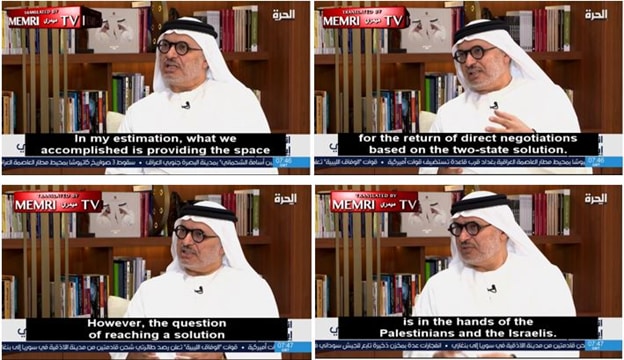
Dr. Anwar Gargash, the UAE Minister of State for Foreign Affairs, said in an August 13, 2020 interview on Al-Arabiya Network (Saudi Arabia) that the "right moment" and "optimal time" to act regarding the Israeli-Palestinian conflict will never arrive. He said that the UAE's recent formal establishment of relations with Israel was done in order to prevent Israeli annexation of parts of the West Bank. In an August 15, 2020 interview on Al-Hurra TV (U.S.), he said that the establishment of UAE-Israel relations is meant to provide space for negotiations between Israel and the Palestinians surrounding a two-state solution. He also said that he hopes that the newly-established relations with Israel will lead to tourism, economic investments, and embassies. In an August 13 interview on Abu Dhabi TV (UAE), Dr. Gargash said that Israel already has official relations with Egypt and Jordan, as well as unofficial relations with other Arab countries. He added that the UAE decided to openly establish relations with Israel because it believes that transparency is its best currency.

Lebanese MP Wehbe Katicha said in an August 3, 2020 interview on OTV (Lebanon) that Hizbullah and Lebanon can do little against Israel, and that Hizbullah's missiles and weapons actually serve to control Lebanon and incorporate it in the Iranian-Syrian "axis." "Why should four million Lebanese bear the brunt of the Palestinian cause?" he asked.

Former Kuwaiti Information Minister Sami Abdullatif Al-Nesf said in a July 1, 2020 interview on Diwan Al-Mulla Internet TV (Kuwait) that the Palestinians made a mistake by rejecting the Deal of the Century, particularly since they have not suggested an alternative. He said that the Palestinians have historically ended up losing every time they rejected an offer, and he said that they rejected the Deal of the Century just for the sake of rejection.

Former Jordanian minister and diplomat Ambassador Ahmad Masa'deh said in a July 1, 2020 interview on Roya TV (Jordan) that although he believes that the Palestinian cause is just and that Palestinian land was plundered, the time has come to think realistically regarding the conflict with Israel and follow a course of action that is legally and politically pragmatic. He said that Arabs must acknowledge the reality that they have been defeated militarily, politically, and diplomatically, that the influential world powers support Israel, and that the United Nations and the E.U. have little impact with regard to helping the Palestinians. Emphasizing that some Arab countries are normalizing relations with Israel while others are engaged in civil wars, Ambassador Masa'deh asked: "Why should we in Jordan put ourselves on the frontline? Why should we be responsible for this cause all by ourselves?" Masa'deh served as Jordan's ambassador to the E.U., Belgium, Norway, Luxemburg, and NATO, as well as the Minister for Public Sector Reform.
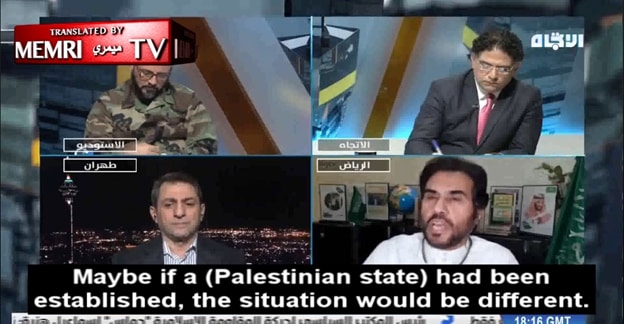
Saudi writer Abdulhameed Al-Ghobain said in a May 21, 2020 show on Etejah TV (Iraq) that there was never an independent Palestinian state, since the territory had previously been under the authority of the Ottoman Empire, followed by the British. He pointed out that most of the Arab countries were established in the beginning of the 20th century - some as late as the 1970s - and that the Arabs, Arab League, and Palestinians had refused to establish an independent Palestinian state when Israel was established in the late 1940s. In addition, Al-Ghobain said that he has come to the conclusion that the Palestinian cause is an illusion and that it has never been a real and just cause. He also criticized the Arabs and Arab leaders for using emotion-based slogans that have nothing to do with reality.

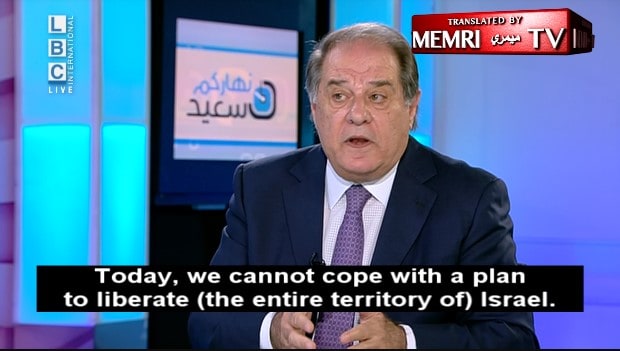
In an interview aired on LBC TV (Lebanon) on May 26, 2020, former Lebanese Minister Sejaan Azzi said that Lebanon does not want war with Israel or anyone else. He said that Lebanon must complete negotiations with Israel in order to achieve secure borders and to make sure the Lebanese army is the only military force in the country. Azzi also said that he is against anyone who wants to wage war with Israel, and that Lebanon has paid a steep price while having helped the Palestinians since 1948. He added that Lebanon cannot withstand another war against Israel, and he asked why it should fight against Israel while the other Arab countries and even the Palestinians are making peace and negotiating with Israel.

Saudi writer Abdulhameed Al-Ghobain said in a May 10, 2020 interview on BBC Arabic TV (U.K.) that the Saudi public is well-informed today and that it no longer cares about the Palestinian cause or about Arab interests. Saying that the Palestinians "have lost," Al-Ghobain explained that Saudis care about their national, strategic, and economic interests, and that Saudi Arabia can benefit from establishing relations with Israel because of how advanced Israel is. He added that relations between Israel and Saudi Arabia have gone "beyond normalization" and are now very warm.

On February 12, 2020, French-Moroccan Professor Youssef Chiheb said in an interview on France 24 Arabic TV that the attitude of the Arab world towards Israel is "archaic" and that the Arab world needs to rethink its attitude towards Israel in light of other emerging dangers such as Iran.
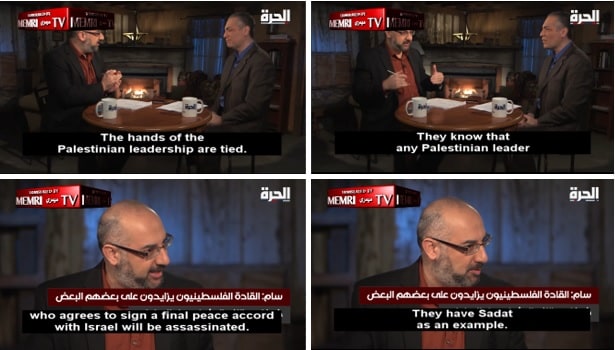
On their Al-Hurra (U.S.) TV show, Syrian-American human rights activist Ammar Abdulhamid and Egyptian-American researcher Samuel Tadros spoke about the Deal of the Century. Egyptian-American Samuel Tadros said that if people really want a "free Palestine" they should demand a Palestinian state that is free, not only from Israeli occupation, but free from the corruption, oppression, and dictatorship, which exist in Arab countries. Syrian-American human rights activist Ammar Abdulhamid said that it was the Arabs who started the Arab-Israeli conflict by rejecting the U.N. Partition Plan in 1947. Tadros asked whether the Arabs really want peace with Israel. He suggested that what the Arabs want is a truce and they will resume war with Israel after they regain power. He said that currently they are dealing with Israel because they are weak and have no choice. He continued to say that support for the Right of Return for Palestinian refugees means the rejection of the State of Israel and changing the country's demographics. Abdulhamid added that the Arabs are "mentally and culturally disposed" to refuse to accept the right of Israel to exist. Later on in the show, Tadros said that the "hands of the Palestinian leadership are tied." They know that any leader who comes up with a final peace accord with Israel will be assassinated, like Egyptian President Anwar Sadat. He said: "All the Palestinian leaders know that they cannot pay the real price of peace." The show aired on February 6, 2020.

Palestinian academic Dr. Amjad Abu El Ezz said in a January 9, 2020 interview on An-Najah NBC TV (Palestine) that although the current situation of the Palestinians is partly a result of the Israeli occupation, the Palestinians themselves also bear a large part of the responsibility for it. He said that the Palestinians in Palestine act as if they are "mentally inhibited" and pointed out that Palestinians in Europe, America, and the Gulf countries are highly productive. Dr. El Ezz also said that the Palestinian identity has been disintegrating since the Oslo Accords and that the Palestinians do not know whether they want peace with Israel or to resume armed resistance.

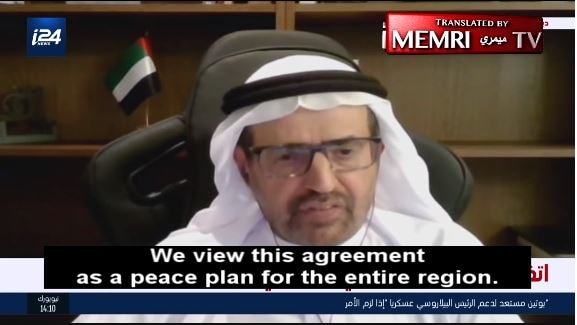
Dr. Ali Al-Noaimi, the Chairman of the UAE Federal National Council's Defense, Interior, and Foreign Affairs Committee, said in an August 31, 2020 show on Sky News Arabia (UAE) and in an August 16, 2020 show on i24 TV (Israel) that the recent UAE-Israel peace deal is a comprehensive peace that is meant to open new horizons for Arabs and Israelis alike. He emphasized that this agreement is should not be compared previous agreements between Israel and Arab countries, in that it is intended to bring "hope for a decent life" to the younger generation of all Arab countries and the Palestinians, in particular. Dr. Al-Noaimi said that the UAE hopes the peace deal will bring stability, security, love, peace, and cooperation in the fields of global relations, politics, medicine, and technology. He said that people are tired of being held prisoner by conflicts, and that the UAE's vision is to build bridges and send a message of peace to Israelis, Arabs, and Iranians.
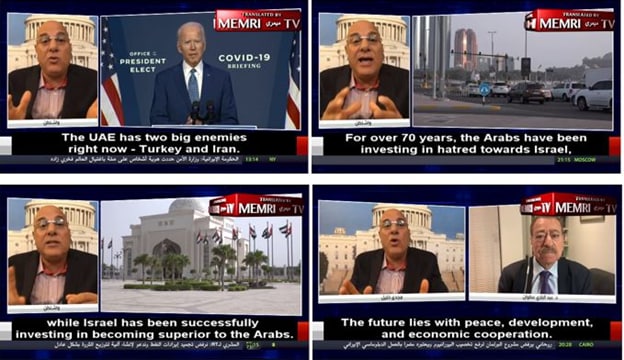
In a December 2, 2020 discussion on Russia Today, Egyptian-American political analyst Magdi Khalil praised peace with Israel and Arab normalization of relations with Israel. He said that the Gulf countries are now considering the interests and the future of their people, and that Israel can be an important ally to the UAE against Turkey and Iran. Khalil described how both Egypt and Jordan benefited from the peace treaties they had signed with Israel, and he elaborated that peace is the natural state between Israel and the Gulf states since Israel has never done anything to stir UAE or Saudi enmity. In addition, Khalil said that many Palestinians seek to turn their cause into a religious struggle and encourage enmity towards the Jews, but that this should be rejected.
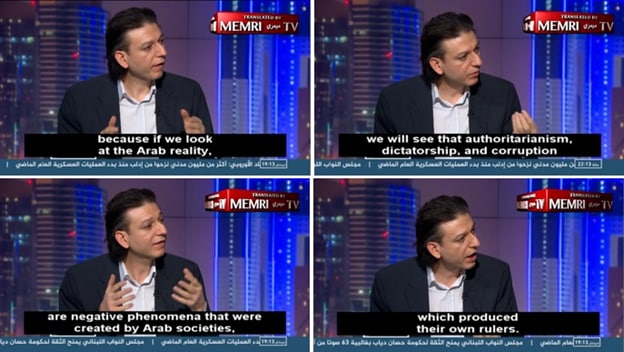
On February 11, 2020, Al-Jazeera Network (Qatar) hosted a debate about Israel and the Arab countries. Syrian journalist Thaer Al-Nashef said that the claim that Israel is thwarting democracy in the Arab countries is completely unfounded, and he argued that all of the dictatorial and authoritarian Arab rulers had been a product of their own Arab societies. He mocked the conspiracy theories that Israel grooms Arab citizens to become leaders of their countries, and he said that Israel is not responsible for the progress or backwardness of Arab societies. Rather, he said that Arabs are responsible for their own development and that they might learn something from the Jews and their ability to "make miracles out of the impossible." Furthermore, Al-Nashef said that the often-repeated claim that Israel's goal is to expand from the Nile River to the Euphrates River is false, and that the two blue stripes on the Israeli flag represent the Jewish prayer shawl, and not these two rivers. Sati' Muhammad Al-Hajj, the Political Secretary of the Nasserist Unionist Party of Sudan, rebutted that Israel's goal to expand from the Nile to the Euphrates is not a myth because it is clearly mentioned in the Protocols of the Elders of Zion.

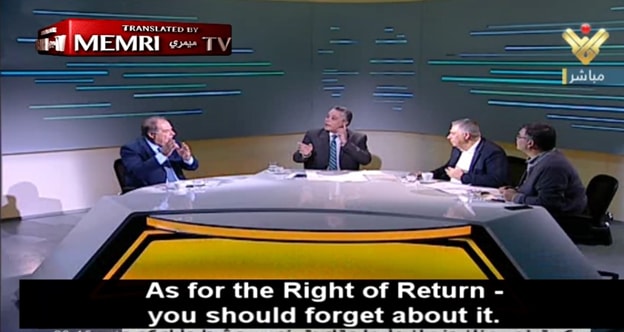
On January 31, 2020, former Lebanese minister Sejaan Azzi participated in a panel that aired on the Hizbullah-affiliated Al-Manar TV (Lebanon). Azzi discussed the Palestinian right of return, saying that it collapsed with the Oslo Accords and that it cannot be implemented. He suggested that the Palestinian refugees in Lebanon should be dispersed to other countries that have the resources to provide them with livelihoods. Azzi added: "You have to choose between their repatriation [in Lebanon] and dispersing them once again."






